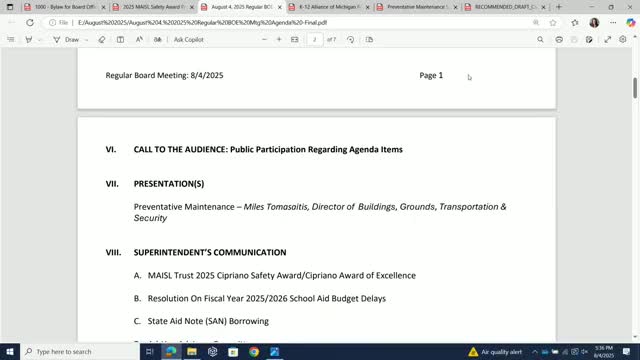Facilities director outlines preventative-maintenance program, FMX work-order use and AED upgrades

Summary
Miles Thomasitis, the district director of buildings, grounds, transportation and security, summarized routine and annual preventive-maintenance tasks, the district's move from SchoolDude to FMX for work orders, upgrades to AEDs and the schedule for roof, boiler and backflow inspections.
Miles Thomasitis, the district director of buildings, grounds, transportation and security, told the board the district uses a preventative-maintenance schedule that runs year-round and is now managed in FMX, a centralized work-order and maintenance system.
Thomasitis said the district migrated from SchoolDude to FMX after he took the role, and that FMX now handles building maintenance work orders and has been expanded to include IT preventative tasks developed by the district's IT coordinator, Ryan Kinnick. "FMX — we process all of our work orders," Thomasitis said, and he described FMX as allowing scheduling of checks that can be weekly, monthly, quarterly, semiannual or annual depending on the item.
Items Thomasitis listed that are on the schedule include: - Monthly AED inspections and a recent equipment upgrade to single "UniPad" AED pads so the district no longer needs separate adult and child pads. - Roof inspections in spring and fall followed by roof cleaning and debris removal. - Annual boiler inspections and CSD 1 certification processes. - Backflow inspections for fire-suppression systems performed to township and state requirements; the township will send notices after the district completes inspections. - Filter changes for rooftop units and air handlers, regular sump-pump and tunnel checks, playground mulch refreshes and annual playground certifications, and routine fire-extinguisher checks through an external provider (Fire Systems of Michigan).
Thomasitis said floor stripping and waxing occur annually — partly deferred in some areas because of recent bond work — and that staff prioritize most-needed areas. He also described daily rounds to identify door and frame corrosion and sidewalk hazards, and said exterior door replacements are budget-dependent; some replacements have been handled from general funds when a door was beyond repair.
Board members asked practical questions about walk-throughs and scheduling. Thomasitis agreed to add quarterly sidewalk inspections to FMX and to rely on building staff to report issues as part of routine work. He also noted the district tests and services elevators through an outside vendor; the state fee process for elevator certificates has changed since the pandemic, and an inspection the district paid for had not yet been completed as of the meeting.
Why it matters: The presentation tied maintenance work to safety and asset preservation, and the board flagged the value of a documented, recurring inspection routine to avoid deferred-maintenance escalation and potential safety risks.

